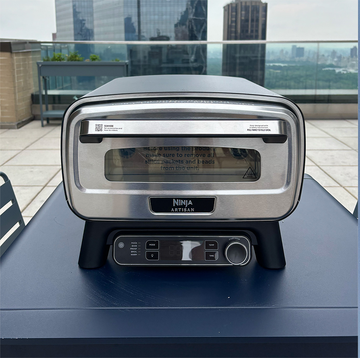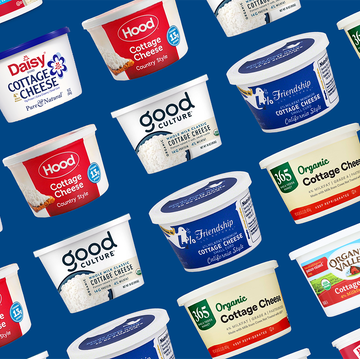If you were to look at the percentage of times I actually have cold, hard cash in my wallet, the number would be low. It seems like you truly need it less and less these days. I can scarcely remember the last time I even held a coin.
Sure, there are still some cash-only bars and restaurants you stumble in from time to time, but other than that, most people buy things with credit cards or via Apple Pay. However, there is good reason to have some cash on hand when you're out and about—especially when you happen to be dining at a restaurant, bar, or cafe.
And the reason is for tips. The fact is, cash tipping is the only way to ensure that your servers actually walk away with 100% of their tip money. It's sad, but it's true.
As former bartenders, servers, and cooks, Delish editors have plenty of opinions. Here’s why you should bypass the credit card tip screen and leave cash instead.
The Server Won't Get The Tip Immediately
One of the biggest reasons to avoid tipping on a credit card is that the service worker won't get that money right away. Cash tips, on the other hand, are a big bonus on both psychological and practical levels. According to Digital Food Production Assistant Colton Trowbridge, a longtime server who has worked in both Kansas and NYC restaurants, cash tips are better because they provide immediate evidence of earning money: instant gratification.
"It feels a little bit more real when it’s in your hand," he says. This might sound trivial, but when you’re in the middle of a crazy eight-hour brunch shift and your guaranteed hourly rate is only 50% of the legal minimum wage, tangible proof that you are actually earning decent money counts for a lot.
Cash tips are also important because they mean that the server will likely get to take the money home that night (!). They won't need to wait two weeks to receive it with a paycheck. This is often true even if the server has to pool their cash tips with others at the end of the night. "I have worked in a pooled house where cash is divided up evenly and then it’s given to you," Trowbridge shares. "In that case, I prefer it for sure."
For some servers, this day-to-day cash flow may not be necessary, but for others, it may be as critically important as allowing them to buy food for their families or pay the babysitter who watches their children while they are working. Of course, this varies by the individual, and there’s no way customers can know a specific worker’s situation. Regardless, cash is always the best bet.
Cash Tips Leave Less Margin For Error
There’s significantly less margin of error when you tip in cash—think about it: A $10 bill is always going to be exactly ten dollars, and when you give it to your server, they have it securely in their hand and its value is indisputable. But when you tip on a credit card, there are many potential pitfalls. If you’re writing the tip on a printed slip, there's the possibility of written errors. Maybe you put the period in the wrong place and end up tipping way less (or way more!) than you intended. Maybe you did the math wrong and put a different amount altogether. Maybe you forgot to sign the slip or, worse, took the signed slip with you by accident.
I have personally lost at least two or three sizable tips when customers erroneously walked out the door with those slips. In these cases, the restaurant’s payment has already been processed, but the only proof of the tip left on the credit card is that slip they scrawled on. Without it, the server is left empty-handed. And that's no good.
Businesses Can Deduct Credit Card Processing Fees From Tips
In most states, it is 100% legal for businesses to pay their credit card processing fees from the tip money left for servers on credit cards.
This is clearly stated on the U.S. Department of Labor website under the Fair Labor Standards Act: "Under the FLSA, when tips are charged on customers' credit cards and the employer can show that it pays the credit card company a percentage on such sales as a fee for payment using a credit card, the employer may pay the employee the tip, less that percentage. For example, where a credit card company charges an employer 3 percent on all sales charged to its credit service, the employer may pay the tipped employee 97 percent of the tips without violating the FLSA. "
Only Maine, Massachusetts, and California have laws banning this. So, to be absolutely clear, if you have tipped a server on a credit card in any other state, there’s a high probability that the server (or the pooled house the server belongs to) doesn’t receive the full tip you left them.
Most businesses do not necessarily tell their staff when they are deducting credit card fees from the tip pool. Trowbridge shared that he has worked at one restaurant where he knew they were taking out the fees, but only because he asked them point-blank.
"It’s frustrating," he says. "I don’t think that’s something that most people are aware of." Since then, he has worked in several other spots where he and his fellow servers might have been losing out on credit card tip money because of processing fees, yet it was never really discussed. "It’s definitely not a big topic of conversation in the industry."
In this age of contactless payment, it takes extra planning to make sure you have cash on hand for tipping—but all things considered, it’s definitely worth it. Come tip time, nix the card, reach for your wallet, and tell your server you’ll be leaving the tip in cash. They’ll certainly appreciate that extra effort.














